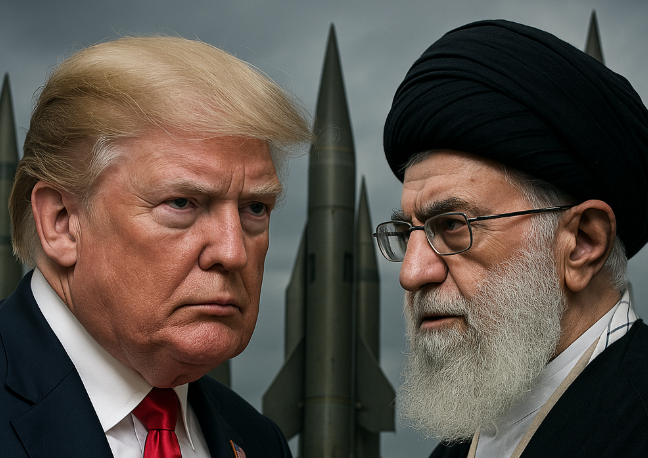
In a dramatic turn of events, United States President Donald Trump recently announced a ceasefire agreement between Iran and Israel, stating that both nations had reached a mutual understanding to halt hostilities. However, within just a few hours of the announcement, Iran launched fresh missile attacks on Israel, raising serious doubts over the sustainability of the ceasefire.
The Israeli Defense Forces (IDF) confirmed that Iran fired missiles at Israel on three separate occasions within a span of just one hour, resulting in the death of six civilians. As the attacks unfolded, air raid sirens echoed throughout Tel Aviv, forcing residents to seek refuge in secure shelters. This sequence of events has led to questions about the effectiveness of the ceasefire and whether Iran is willing to adhere to the agreement, or if President Trump’s declaration has any real influence over Iran’s military actions.
In President Trump’s initial announcement, he outlined a phased ceasefire plan. According to the plan, Iran was to begin the ceasefire six hours after the announcement, followed by Israel 12 hours later. After 24 hours, the 12-day-long war was to be officially declared over. However, Iran’s swift missile strikes suggest that the agreement might not be holding on the ground.
Iran, on its part, has maintained that it does not intend to continue military operations unless provoked by Israeli attacks. Iranian Foreign Minister Abbas Araghchi issued a strong statement emphasizing that Iran’s powerful military would punish Israel until the very last moment for its aggression. Araghchi expressed deep gratitude towards Iran’s armed forces, praising their readiness to defend the country with the last drop of their blood and for responding decisively to every Israeli assault.
One of the reasons behind Iran’s aggressive response even after the ceasefire announcement is the immense damage it has suffered during the conflict. The United States, siding with Israel, carried out devastating airstrikes targeting three of Iran’s major nuclear sites — Fordow, Natanz, and Isfahan — using bunker-buster bombs. These attacks are believed to have caused significant destruction to Iran’s nuclear infrastructure.
In addition to the attacks on its nuclear facilities, Iran has suffered heavy losses among its top military leadership. Notably, the chief of Iran's Islamic Revolutionary Guard Corps, Hossein Salami, along with several senior military commanders and nuclear scientists, were killed in Israeli strikes. The human cost of the conflict has been devastating for Iran, with reports suggesting that nearly 1,000 Iranian citizens have lost their lives. The conflict has also wreaked havoc on Iran’s critical infrastructure, further compounding the nation’s losses.
Throughout this intense conflict, Iran found itself largely isolated on the international stage. While countries like Russia and China extended moral support, they refrained from directly intervening against the United States and Israel. No Middle Eastern nation openly sided with Iran, leaving it to fight its battle alone.
The latest missile attacks by Iran, despite the ceasefire agreement, appear to be a calculated message. Tehran seems determined to demonstrate that it will not succumb to external pressure or accept ceasefire terms dictated by other nations, particularly when they are perceived to be imposed by third-party powers like the United States. Iran’s leadership wants to assert that any ceasefire has been accepted on its own conditions, not due to coercion.
Internally, the Iranian leadership is also facing mounting pressure. With hundreds of civilian casualties and the growing risk to top officials, including Supreme Leader Ayatollah Khamenei, who himself was reportedly targeted by Israeli forces, hardline factions within the Iranian establishment have been demanding a strong and uncompromising stance against both Israel and the United States. The latest missile strikes serve as both a retaliation and a signal to domestic hardliners that the leadership remains firm and unwavering in defending the nation’s sovereignty and honor.
In summary, while President Trump’s ceasefire announcement was intended to bring an end to a brutal 12-day war, the immediate missile attacks from Iran reflect the deep complexities and hostilities that continue to drive the conflict. Iran insists it did not initiate the war and does not desire prolonged conflict, but it remains committed to responding forcefully to any acts of aggression. The fragile ceasefire remains on shaky ground as both sides continue to exchange threats and violence, keeping the region on edge and the international community deeply concerned about the risk of further escalation.
Disclaimer:
This article is based on ongoing developments and multiple media sources. The situation in the Middle East remains fluid, and facts may continue to evolve. Readers are advised to follow official government statements and verified news sources for the latest updates. The content is intended for informational purposes only and does not reflect any political stance.




